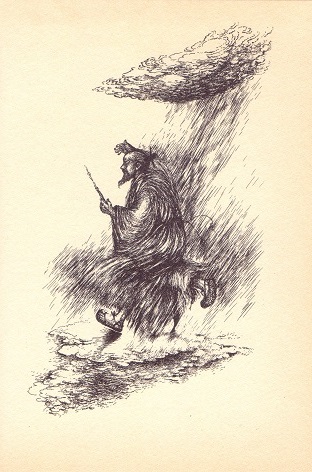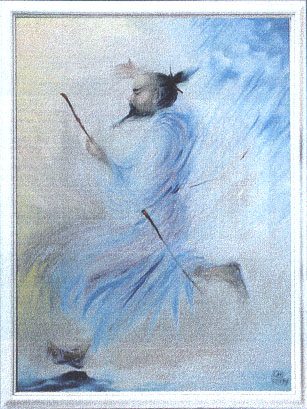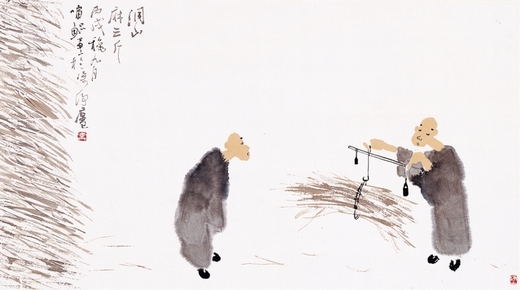ZEN IRODALOM ZEN LITERATURE
« Zen főoldal
« vissza a Terebess Online nyitólapjára
洞山守初 Dongshan Shouchu (910-990)
(Rōmaji:) Tōzan Shusho
Tartalom |
Contents |
| Tung-san Sou-csu mondásaiból Fordította: Terebess Gábor |
"Living Words and Dead Words" |
"Living Words and Dead Words"
(From The Transmission of the Lamp, Chüan 23)
Translated by Chang Chung-yuan
In: Original Teachings of Ch'an Buddhism. New York: Random House, 1969. pp. 296-201.
CH'AN Master Shou-ch'u Tsung-hui of Tung-shan in Hsiang-chou[41] visited Yün-men, who asked him: "Where have you come from recently?"
"From Ch'a-tu."
"Where were you during the summer?"
"I was in the Pao-tzu Monastery in Hunan."
"When did you leave there?"
"In the eighth month of last year."
"I absolve you from thirty blows!"
The next day Tung-shan went to question Master Yün-men, saying, "Yesterday you were pleased to release me from thirty blows, but I do not know what my fault was."
"Oh, you rice-bag! This is the way you wander from the west of the River to the south of the Lake!"[42]
When Tung-shan heard this, he was suddenly enlightened.
When Tung-shan had become an abbot himself, a monk asked him, "What is that path which is very remote?"
He replied: "One does not want to go out on a fine day, but postpones it until the rain is falling heavily on one's head."
Monk: "Who are all the wise men?"
Master: "Those who get into mud and water."
Monk: "Before mind exists, where are things?"
Master: "The lotus leaves move without a breeze, so there must be fish swimming by."
Monk: "Master! When you ascend to your lion-seat,[43] please sing a song of Tao!"
Master: "During the dry season the irrigation ditches are dredged. There is no need of a waterworks office, as there is no flood."
Monk: "Such being the case, may I thank you for your instruction?"
Master: "The old woman who sells shoes walks fast."
Monk: "What are the Three Precious Ones?"[44]
Master: "It is beyond discussion."
Monk: "What is the seamless pagoda?"
Master: "The stone lion at the crossroads."
Monk: "What is the Dharma that is free from life and death?"
Master: "It is what you look at but do not take, though you have longed for it for three years."
Monk: "Free yourself from mental activity and perception and then say a word!"
Master: "The Taoist priest wearing a yellow robe sitting in an earthen jar."
Monk: "I just happen to have come back to visit you. Please say a word!"
Master: "How can one say anything when one has arrived there?"
Monk: "Please say what is revealed in meditation."
Master: "I will absolve you from thirty blows."
Monk: "Where is it that I am at fault?"
Master: "A crime may not be punished twice."
Monk: "What is the lotus blossom before it comes out of the water?"
Master: "The top of Mount Ch'u[45] when it is turned upside down."
Monk: "What is it after it comes out of the water?"
Master: "The River Han[46] follows its course and flows eastward."
Monk: "What is the sharpest sword, which cuts a hair blown against its edge?"
Master: "The visitor from Chin-chou."[47]
A nun asked, "How is it when the cart stops but the cow does not?"
Master: "What is the use of a driver?"
Monk: "What is the duty required of a Ch'an monk?"
Master: "When the clouds envelop the top of Mount Ch'u, there will be a heavy rainstorm."
Monk: "How will it be when all the water in the sea is gone, and all the men in the world have passed away?"
Master: "It is very hard to be like that!'
Monk: "How is it to be just that way?"
Master: "The clouds are in the sky, and water is in the vase."[48]
Monk: "What is it when being and non-being both disappear and both temporal and real are forgotten?"
Master: "The top of Mount Ch'u when it is turned upside down."
Monk: "Is it possible for me to understand this?"
Master: "There is a way."
Monk: "Please tell me the way."
Master: "It is one thousand miles and ten thousand miles."
Monk: "How about Niu-t'ou before he saw the Fourth Patriarch?"
Master: "A staff of chestnut wood."
Monk: "What was he after his interview?"
Master: "Tou-pa's[50] cotton garment."
Monk: "What is Buddha?"
Master: "Obviously, correct."
Monk: "What is the state in which all causation has completely ceased?"
Master: "The stone man inside the earthen jar sells date candies."
Monk: "What is the sword of Tung-shan?"
Master: "Why?"
The monk persisted, "I want to know."
Master: "Blasphemy!"
Monk: "To give no attention to heaven and earth and to have no concern for the universe - this is my attitude. How about you?"
Master: "Around the pavilion on Hsien-shan[51] the mist is rising; the foreshore is steep and the boat cannot linger."
Monk: "Now the audience is all gathered together here. Please point out the essence of Ch'an, and tell us its general principles."
Master: "Bubbles on the surface of the water reflect all kinds of color; frogs from the depth of the pond croak under the bright
moonlight."
Monk: "At this very moment, where are Manjusri and Samantabhadra?"
Master: "The elder's age is eighty-one. Such a tree does not grow mushrooms."
Monk: "What is the meaning of this?"
Master: "In the first place, it is not possible; in the second place, it is not of the right kind."
In the seventh month of the first year of Shun-Hua (990) the Master, without illness, seated himself with his legs crossed, and passed away. [52]
NOTES
41. Now Hsiang-yang, a town on the Han River in northwestern Hupeh Province.
42. The Yangtze River and the Pan-yang Lake.
43· Tradition holds Buddha the lion among men. The place where he sits is called the simhasana, or lion-seat.
44· The Triratna: Buddha, Dharma, Sangha (monk).
45· A mountain in northern Hupeh Province.
46. The Han River has its source in southern Shensi Province, then flows southeastward and enters the Yangtze in Hupeh Province.
47· Now An-k'ang, a town on the Han River in southern Shensi Province.
48. This was the statement made by Yo-shan Wei-yen (751-834) when he interviewed Li Ao, a great neo-Confucianist and also Governor of Lang-chou.
49· Tao-hsin (580-651).
50. "Tou-pa" is a name for rural folk.
51. Mount Hsien, south of Hsiang-yang, Hupeh Province.
52. Records of Pointing at the Moon, Chüan 21.
Tung-san Sou-csu összegyűjtött mondásaiból
Fordította: Terebess Gábor
Vö.: Folyik a híd, Officina Nova, Budapest, 1990, 109-110. oldal
– Hogy fordulhat elő, hogy a szekér megáll, de az ökör megy tovább? – kérdezte egy apáca.
– Mire való a hajcsár? – kérdezte Tung-san Sou-csu.
Tandori Dezső rajza: [L(ótusz) halakkal]– Mielőtt létezett volna a tudat, hol voltak a tárgyak?
– Ha szélcsendben rezegnek a lótuszlevelek, biztos hal úszkál mellettük – mondta Tung-san.
– Milyen kötelességei vannak egy csan szerzetesnek?
– Ha a Csu-hegy sötét felhőkbe borul, vihar közeledik – mondta Tung-san Sou-csu.
– Mikor szűnik meg minden oksági viszony?
– A cserépkorsóban ücsörgő kőember jujubával töltött süteményt árul – mondta Tung-san Sou-csu.


Lacza Márta illusztrációja és festménye– Mi a távoli ösvény? – kérdezte egy szerzetes.
– Amíg szép idő van, húzódozunk kimenni, mire pedig ráfanyalodunk, eső áztatja el a fejünk – mondta Tung-san Sou-csu.
– Mi a Buddha? – kérdezte egy szerzetes.
– Három mérő lenzsávoly – mondta Tung-san Sou-csu.

Li Hsziao-kun illusztrációján egy köteg lenkóró lóg a mérlegen
– A hallgatóság összegyűlt – jelentette ki egy szerzetes. – Kérlek, mutass rá a csan lényegére, és sorold fel az alapelveit.
– A habokon tükröződik a szivárvány minden színe – mondta Tung-san Sou-csu –, a tó mélyén békák brekegik a fényes holdat.